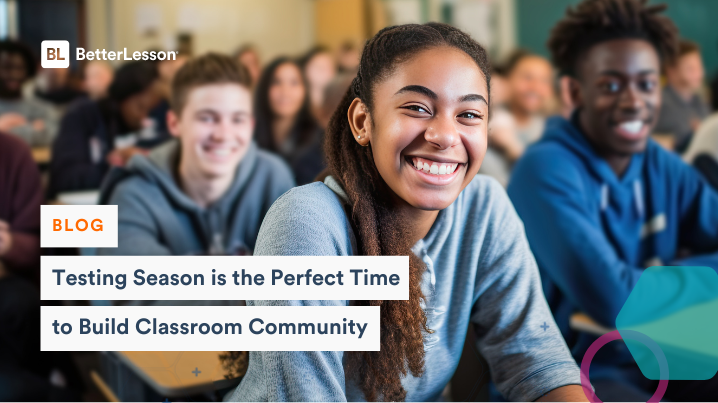Springtime in school brings with it the anticipation of standardized testing and excitement for summer–even though it is still over two months away! All this can make students restless, impacting their engagement and focus. But despite these challenges there is an opportunity: integrating classroom-building activities into your routine now will foster a positive learning environment that will help get students–and teachers–through testing season and beyond.
Classroom Community & Classroom Management
Fostering a positive classroom community works hand-in-hand with a strong classroom management strategy. A supportive and inclusive environment helps you set and maintain clear rules and expectations for your class, while also enhancing academic performance and contributing to students’ social-emotional well-being. Research consistently shows that students thrive when they feel connected to their peers and teachers, making classroom community-building activities an important part of a well-rounded and effective education.
Preparing for Testing Season
As standardized testing looms overhead, it’s natural for both students and educators to experience increased stress and pressure. However, a cohesive classroom community can act as a powerful buffer against testing anxiety. By nurturing a sense of belonging and mutual support, teachers can create an environment where students feel confident and motivated to excel. Incorporating team-building exercises, collaborative learning projects, and peer-to-peer support initiatives can help alleviate test-related stress while fostering the positive mindset necessary for academic success.
Navigating the Springtime Behavior Slump
The arrival of spring often coincides with a decline in student focus and motivation. Even though summer is still months away, it can still feel difficult to maintain classroom discipline during this time of year. However, proactive measures aimed at strengthening classroom communities can mitigate the effects of the behavior slump. By reinforcing shared values, establishing clear expectations, and promoting a sense of ownership over classroom norms, teachers can cultivate an environment where students are invested in maintaining positive behavior throughout the spring months.
Practical Strategies for Classroom Community-Building
So, how can teachers build a learning community, instead of just managing a classroom? By building relationships, students will feel more comfortable seeking support, collaborating, and taking ownership of learning.
Let’s explore some practical strategies to integrate into your daily routine, all of which are curated by our Social Emotional Learning (SEL) partner, Kikori:
Morning Meetings: Start each day with a brief check-in where students can share highlights or concerns, fostering a sense of belonging and empathy.
Cooperative Learning Activities: Encourage collaboration through group projects and discussions, promoting teamwork and communication skills.
Class Celebrations: Recognize achievements and milestones, reinforcing a culture of positivity and mutual support.
Community Service Projects: Engage students in activities that benefit their local community, instilling a sense of responsibility and civic engagement.
Reflection and Feedback: Provide opportunities for students to reflect on their learning experiences and offer feedback to one another, promoting self-awareness and growth.
Self-awareness and self-regulation are crucial skills for any young learner to develop in order to understand the impact of emotions–during testing season and beyond. Increasing a student’s “awareness of self” results in their ability to prioritize goals, remain accountable, and exercise discipline. And when teachers have a strong understanding of these competencies they’re better equipped to model and support these skills in their classroom community.
As educators, we have the power to shape not only our students’ academic outcomes but also their overall well-being. By cultivating a strong classroom community, we can equip students with the social and emotional skills needed to thrive, even when they are restless and anxious for testing and summer break. It’s a great time to make sure we are creating environments where every student feels valued, supported, and empowered to succeed.
If you’d like to bring classroom community or SEL practices into your school or classroom, Kikori can help!
Get in Touch







